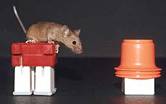
TUESDAY, May 25 (HealthDay News) — Could certain germs help you learn more easily? New research suggests bacteria could indeed, at least if you spend time outdoors and inhale or consume them.
Researchers looked at mycobacterium vaccae, a kind of natural bacteria that’s found in soil. People ingest or breathe in the germ when they spend time in nature, researcher Dorothy Matthews of The Sage Colleges in Troy, N.Y., said in a news release.
Previous research suggested that the germ, when heat-killed and injected into mice, boosted levels of serotonin and lowered anxiety levels. Since serotonin levels are associated with learning, Matthews and her colleague Susan Jenks decided to feed the live bacteria to mice and see if they did a better job of learning a maze than control mice who were not fed the germ.
The mice who ate the bacteria “navigated the maze twice as fast and with less demonstrated anxiety behaviors as control mice,” Matthews said.
The mice did a better job navigating the maze even after they stopped dining on the bacteria, the researchers reported, although a statistically significant effect appeared to disappear three weeks later.
The findings suggest that the germs “may play a role in anxiety and learning in mammals,” Matthews said, and speculated it’s possible that “creating learning environments in schools that include time in the outdoors,” where the germ is commonly found, “may decrease anxiety and improve the ability to learn new tasks.”
The findings were scheduled to be released Monday at the general meeting of the American Society for Microbiology in San Diego.
More information
For more about children’s brains and learning, try kidshealth.org.

